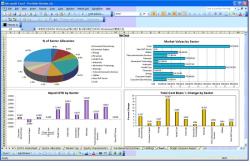What are the benefits of using a docker compose file?
Docker Compose files provide several benefits for managing multi-container applications and services in a Docker environment. Here are some of the key advantages of utilizing Docker Compose files:
Easy Application Definition: Docker Compose allows you to define the entire configuration of your application and its services in a single, easy-to-read YAML file. This file serves as the source of truth for your application's architecture, making it simple to understand and maintain.
Container Orchestration: With Docker Compose, you can define and run multiple containers as a single service. It simplifies container orchestration and ensures that all containers required for your application are started together and in the correct order.
Environment Isolation: Compose files enable you to specify the environment variables, networks, volumes, and other configurations for each container. This isolation helps prevent conflicts and simplifies the management of environment-specific settings.
Efficient Development Workflow: Docker Compose streamlines the development workflow. Developers can define and spin up the necessary containers for their application with a single command, making it easy to develop, test, and debug applications in a consistent environment.
Version Control and Collaboration: Compose files can be versioned alongside your code, allowing for better collaboration among team members. Everyone uses the same configuration, reducing discrepancies between development, testing, and production environments.
Service Scaling: You can define the desired number of replicas for each service in the Compose file, enabling easy scaling of services horizontally to meet increased demand.
Service Dependencies: Docker Compose allows you to define dependencies between services, ensuring that dependent services start and stop together. This is crucial for applications that rely on databases, message brokers, or other services.
Easy Service Linking: Services defined in a Compose file can easily reference each other by their service names, making inter-service communication straightforward.
Port Mapping: Compose files enable you to map container ports to host machine ports, allowing external access to services running within containers.
Simplified Configuration Updates: When you need to update configurations, add new services, or make changes to your application architecture, you can do so by modifying the Compose file and then redeploying the updated configuration.
Compatibility with Docker Swarm and Kubernetes: Compose files can be used as a basis for orchestrating containers in more advanced orchestration tools like Docker Swarm and Kubernetes. This means you can start with Compose for development and then scale to production with minimal changes.
Cross-Platform Deployment: Compose files are portable and can be used across different platforms and environments that support Docker, reducing deployment inconsistencies.
Overall, Docker Compose files provide a powerful and user-friendly way to define, manage, and orchestrate multi-container applications. They simplify the containerization of applications and enhance the consistency and reliability of your development and deployment processes.












